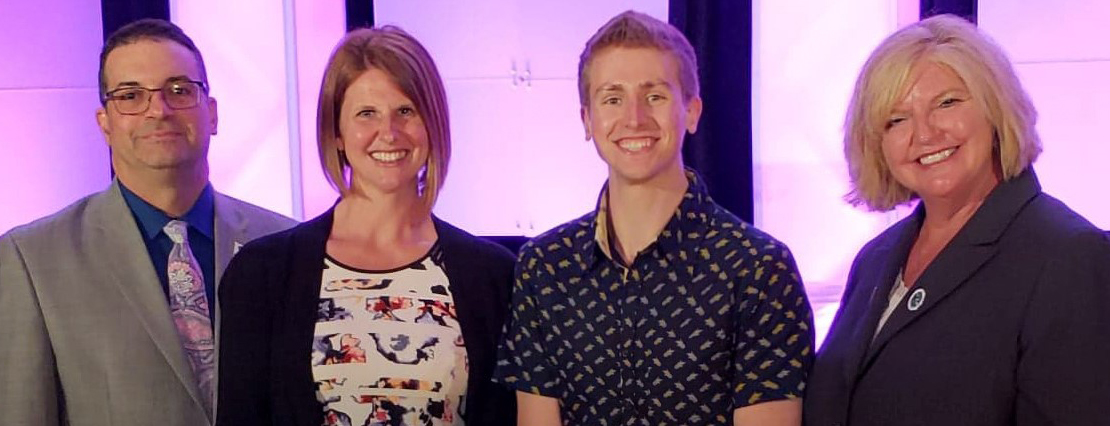Garrett County Health Department Receives National Award and Recognition for Innovative Practice to Improve Health Equity and Stakeholder Engagement

Pictured above: Kevin Sumner, Current NACCHO President, Shelley Argabrite, Garrett County, Maryland Strategic Health Planner, John Corbin, Garrett County Health Department Public Affairs Specialist, and Lori Tremmel Freeman NACCHO CEO
The Garrett County Health Department Population Health, Innovation, and Informatics Unit, located in Garrett County, Maryland, recently received a national award and recognition as its innovative health planning collaborative pilot project, the Garrett County Planning Tool, located on MyGarrettCounty.com, continues to receive nationwide attention for its novel approach to conducting community health improvement planning.
The project, having already received national recognition and funding as a Public Health Innovation by the Public Health National Centers for Innovation (PHNCI), a division of the Public Health Accreditation Board (PHAB), and the Robert Wood Johnson Foundation, and contributing as a distinct advantage in Garrett County’s successful bid to be the first community in the state of Maryland to be awarded a Culture of Health Prize, is now recognized and awarded as a Promising Practice by the National Association of County & City Health Officials (NACCHO).
The Garrett County Health Department’s Innovation Team, consisting of Shelley Argabrite, a graduate of Ball State University, and John Corbin, a graduate of Frostburg State University, attended the 2018 NACCHO Annual Conference alongside Garrett County Health Officer Bob Stephens and Garrett County Local Management Board Director Fred Polce to receive the award and present an informational session on the implementation of the Garrett County Planning Tool pilot project.
“Continuous investments in community engagement and health equity practices are the cornerstones of our agile transition to Public Health 3.0, and Garrett County is committed to advancing work that places the utmost importance on improving health outcomes for all of our community stakeholders,” said Argabrite after receiving the award.
The pilot project, designed as an open source tool for Public Health agencies to advance health equity and stakeholder communications across the globe, was also recently awarded a replication funding cycle from PHNCI and the Robert Wood Johnson Foundation to deploy five additional pilots across the United States to test the ability of the tool to transform health equity practices and improve opportunities for stakeholders to become active participants in improving health outcomes. The pilot project sites range in size and geographic region, and include the communities of the District of Columbia, Clackamas County, Oregon, Medina County, Ohio, Flathead City & County, Montana, and Allegany County, Maryland.
The tool, developed as modular open source extensions for the popular WordPress and BuddyPress platforms, seeks to enable any community to have the opportunity to improve transparency and health equity practices, regardless of available resources, by collecting actionable hyper local data and activating stakeholders to achieve equitable health outcomes.
“Developing open source tools is paramount to the successful transition of Public Health as we seek to transform stagnating indicators and improve health equity practices. By enabling any community to utilize these free, modular extensions, we are expanding the capabilities of these powerful platforms to become increasingly relevant to Public Health practice and provide more effective and efficient solutions for our stakeholders,” said Corbin.
The open source release of the tool, branded as the Universal Community Planning Tool, and accompanying strategy development framework are available on equityengage.com and as a public GitHub repository.
“Releasing this work as an open source project enables communities not only the opportunity to replicate our successes, but also continue to develop and share innovative solutions that advance not only community-level population health, but improve access to care for the global population,” said Corbin on open source development.
The Garrett County Planning Tool pilot project experienced rapid growth and widespread community approval and appreciation over the last eighteen months, engaging over 20,000 users and more than 1,900 community planning partners in the development of the most recent Garrett County Community Health Improvement Plan. Through the release and adoption of this tool, multisectoral data sharing and communications have improved drastically, and the nearly universal onboarding of most community-focused organizations has facilitated a new era of collaborative planning and development, most noticeably in addressing the social determinants of health and upstream root causes of poor health outcomes that are most often associated and attributed to health inequities.
As communities adopt and replicate the tool, the Garrett County Health Department aspires to continue developing innovative solutions to long-standing and persistent health issues as extensions for this framework that will be available to any community at minimal or no cost.
“Developing solutions that deliver not only cost-efficiency, but inspire entrepreneurial spirit within traditionally bureaucratic processes illustrates a drive to put stakeholders at the forefront of planning and policy development, and the monumental shift in transparency practices ensures that accountability for improved outcomes is a direct result of programmatic development and systems-level changes designed to improve population health,” said Argabrite in closing.
Additional information about this innovation can be found on the Public Health National Centers for Innovation website at phnci.org.
Translation services have moved to the navigation bar.
- LAST CHANCE! Register now to become a Vendor at the 2025 Rec Fair for FREE! - June 13, 2025
- 52 Weeks of Prevention – Week 48 - June 13, 2025
- WIC Celebrates Father’s Day - June 13, 2025



